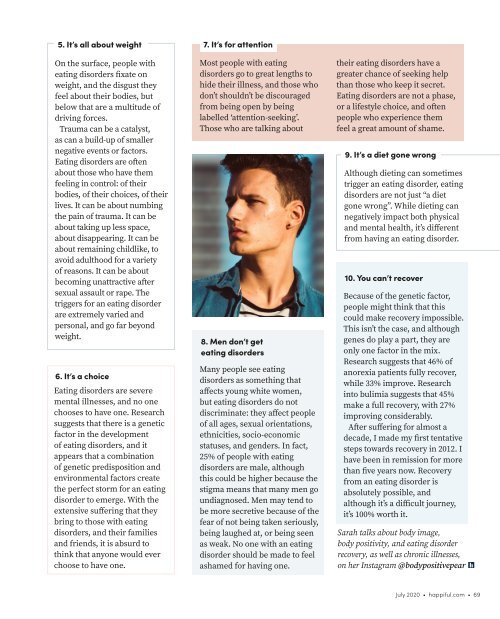You also want an ePaper? Increase the reach of your titles
YUMPU automatically turns print PDFs into web optimized ePapers that Google loves.
5. It’s all about weight<br />
On the surface, people with<br />
eating disorders fixate on<br />
weight, and the disgust they<br />
feel about their bodies, but<br />
below that are a multitude of<br />
driving forces.<br />
Trauma can be a catalyst,<br />
as can a build-up of smaller<br />
negative events or factors.<br />
Eating disorders are often<br />
about those who have them<br />
feeling in control: of their<br />
bodies, of their choices, of their<br />
lives. It can be about numbing<br />
the pain of trauma. It can be<br />
about taking up less space,<br />
about disappearing. It can be<br />
about remaining childlike, to<br />
avoid adulthood for a variety<br />
of reasons. It can be about<br />
becoming unattractive after<br />
sexual assault or rape. The<br />
triggers for an eating disorder<br />
are extremely varied and<br />
personal, and go far beyond<br />
weight.<br />
6. It’s a choice<br />
Eating disorders are severe<br />
mental illnesses, and no one<br />
chooses to have one. Research<br />
suggests that there is a genetic<br />
factor in the development<br />
of eating disorders, and it<br />
appears that a combination<br />
of genetic predisposition and<br />
environmental factors create<br />
the perfect storm for an eating<br />
disorder to emerge. With the<br />
extensive suffering that they<br />
bring to those with eating<br />
disorders, and their families<br />
and friends, it is absurd to<br />
think that anyone would ever<br />
choose to have one.<br />
7. It’s for attention<br />
Most people with eating<br />
disorders go to great lengths to<br />
hide their illness, and those who<br />
don’t shouldn’t be discouraged<br />
from being open by being<br />
labelled ‘attention-seeking’.<br />
Those who are talking about<br />
8. Men don’t get<br />
eating disorders<br />
Many people see eating<br />
disorders as something that<br />
affects young white women,<br />
but eating disorders do not<br />
discriminate: they affect people<br />
of all ages, sexual orientations,<br />
ethnicities, socio-economic<br />
statuses, and genders. In fact,<br />
25% of people with eating<br />
disorders are male, although<br />
this could be higher because the<br />
stigma means that many men go<br />
undiagnosed. Men may tend to<br />
be more secretive because of the<br />
fear of not being taken seriously,<br />
being laughed at, or being seen<br />
as weak. No one with an eating<br />
disorder should be made to feel<br />
ashamed for having one.<br />
their eating disorders have a<br />
greater chance of seeking help<br />
than those who keep it secret.<br />
Eating disorders are not a phase,<br />
or a lifestyle choice, and often<br />
people who experience them<br />
feel a great amount of shame.<br />
9. It’s a diet gone wrong<br />
Although dieting can sometimes<br />
trigger an eating disorder, eating<br />
disorders are not just “a diet<br />
gone wrong”. While dieting can<br />
negatively impact both physical<br />
and mental health, it’s different<br />
from having an eating disorder.<br />
10. You can’t recover<br />
Because of the genetic factor,<br />
people might think that this<br />
could make recovery impossible.<br />
This isn’t the case, and although<br />
genes do play a part, they are<br />
only one factor in the mix.<br />
Research suggests that 46% of<br />
anorexia patients fully recover,<br />
while 33% improve. Research<br />
into bulimia suggests that 45%<br />
make a full recovery, with 27%<br />
improving considerably.<br />
After suffering for almost a<br />
decade, I made my first tentative<br />
steps towards recovery in 2012. I<br />
have been in remission for more<br />
than five years now. Recovery<br />
from an eating disorder is<br />
absolutely possible, and<br />
although it’s a difficult journey,<br />
it’s 100% worth it.<br />
Sarah talks about body image,<br />
body positivity, and eating disorder<br />
recovery, as well as chronic illnesses,<br />
on her Instagram @bodypositivepear<br />
<strong>July</strong> <strong>2020</strong> • happiful.com • 69

















